Welcome
....to JusticeGhana Group

JusticeGhana is a Non-Governmental [and-not-for- profit] Organization (NGO) with a strong belief in Justice, Security and Progress....” More Details
No special treatment for UK over Europe, says Angela Merkel
- Details
- Category: DateLines
- Created on Thursday, 27 February 2014 00:00
- Hits: 3396
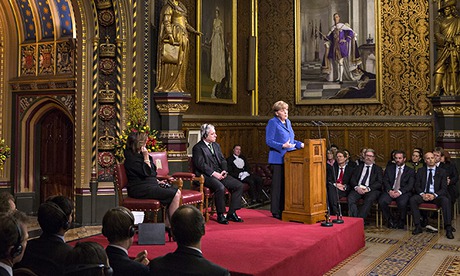 No special treatment for UK over Europe, says Angela Merkel
No special treatment for UK over Europe, says Angela Merkel
German chancellor tells parliament Britain must retain central role in Europe but says patience of EU's other leaders is finite
Nicholas Watt, chief political correspondent
Angela Merkel has pleaded with Britain to remain a strong voice in the EU but said the country cannot expect special treatment if David Cameron embarks on a renegotiation of Britain's membership terms after a Conservative election victory.
The German chancellor opened her speech to a joint session of the UK parliament in English to drive home her message of Britain's central role in the EU, coupled with a warning that the patience of the EU's other 27 leaders with the UK is finite.
MPs and peers laughed as Merkel, who recalled her first visit to London in the spring of 1990 shortly after the fall of the Berlin Wall, said those expecting a "fundamental reform of the European architecture" in Britain's direction would be disappointed.
The chancellor gave little indication whether she would countenance a major revision of the Lisbon treaty – a key Cameron demand to allow him to table his proposals – when she said simply that new eurozone governance arrangements would be introduced through the "necessary legal instruments".
But in the final flourish of her speech, also delivered in English, Merkel said Germany regarded Britain as a vital ally in reforming the EU. "We need a strong United Kingdom with a strong voice inside the EU," she said. "If we have that we will be able to make the necessary changes for the benefit of all."
The speech appeared to be designed to inject a dose of reality ahead of the negotiations, in which the prime minister hopes to introduce widespread reforms of the EU if he wins the 2015 general election. Cameron would then hold an in/out referendum by the end of 2017.
The chancellor made clear that her main priority was to strengthen the euro – by ensuring monetary union was matched by an economic union among eurozone members – with "clear-cut and resilient architecture". This would leave little room for special treatment for one member state.
Merkel told MPs and peers: "I have been told many times during the last few days that there are very special expectations of my speech here today. Supposedly, or so I have heard, some expect my speech to pave the way for a fundamental reform of the European architecture, which will satisfy all kinds of alleged or actual British wishes. I am afraid they are in for a disappointment.
"I have also heard that others are expecting the exact opposite and are hoping that I will deliver the clear and simple message here in London that the rest of Europe is not prepared to pay almost any price to keep Britain in the EU. I am afraid these hopes will be dashed too.
"If what I have been told is true then it will be obvious to everyone that I find myself caught between the devil and the deep blue sea. That is not a pleasant position to be in, at least for a German head of government. Nevertheless, that cannot in any way spoil my pleasure in being here today."
But Merkel made it clear she shared Cameron's objectives to ensure that EU regulation was simplified and that the principle of subsidiarity – that decisions should be made at the lowest possible level – should be re-emphasised.
Speaking in German, she said: "We need to cut unnecessary red tape at the European level that hampers our companies in Germany just as in the UK. We always have to measure up with the best of them in the world. Therefore European rules and regulations need to be subject to regular reviews just as national rules and regulations [do]. Should they prove to be superfluous they have to be scrapped … The principle of subsidiarity needs to be respected more in Europe."
The chancellor reinforced this message with a call for Britain and Germany to remain "united and determined" in reforming the EU and promoting competitiveness. "We, Germany and Britain, share the goal of seeing a strong competitive EU join forces," she said in her final words in German.
Turning to English, she added: "United and determined, we can defend our European economic and social model in the world. United and determined we can bring our values and interests to bear in the world. United and determined we can serve as a model for other regions of the world. This – and nothing less than this – should be our common goal. I regard it as the task for our generation."
Labour said Merkel's speech had brought "warm words, cold comfort" for Cameron.
Source: The Guardian UK
Lee Rigby murder: Michael Adebolajo gets whole-life jail term
- Details
- Category: Law & Justice
- Created on Thursday, 27 February 2014 00:00
- Hits: 3701
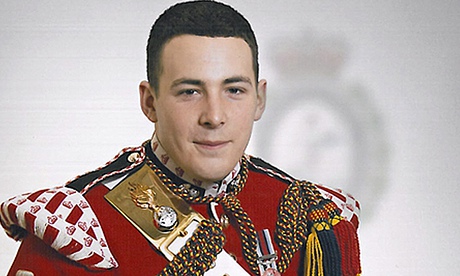 Lee Rigby murder: Michael Adebolajo gets whole-life jail term
Lee Rigby murder: Michael Adebolajo gets whole-life jail term
Michael Adebowale is given 45-year minimum term, after sentencing is interrupted by violent scuffle in dock
Vikram Dodd
The two terrorists who murdered British soldier Lee Rigby on a south London street fought with guards yesterday in the dock of the court yards from the grieving family of the soldier they butchered as a judge sentenced the mastermind of the attack to die in prison.
Michael Adebolajo, 29, who hacked at Rigby's head, was sentenced to a whole-life term for leading the first al-Qaida- inspired terrorist attack on British soil to claim a life since the 7 July bombings eight years ago. The sentence means he is unlikely to ever be released.
His accomplice, Michael Adebowale, 22, who stabbed at the soldier's torso, was ordered to serve a minimum of 45 years in jail. Both men had been convicted unanimously by a jury in December.
The men disrupted sentencing at the Old Bailey, with the dead soldier's family sitting nearby, as the judge, Mr Justice Sweeney, branded them traitors to their religion. The judge began sentencing for the "sickening and pitiless" attack by saying that Adebolajo and Adebowale were converts to Islam who became radicalised and extremists.
Adebolajo had claimed his act of butchery was a military strike commanded by God and that he was a soldier of Allah.
The judge said their actions were "a betrayal of Islam and of the peaceful Muslim communities who give so much to our country".
Adebowale shouted "that is a lie" at the judge, later shouting "you know nothing about Islam" in Sweeney's direction.
After more barracking, the judge said: "Gentlemen you have a choice"– only to be interrupted as mayhem broke out.
Adebowale shouted: "I swear by Allah that America will not be safe."
At that point Adebolajo joined in, shouting "Allahu Akbar" ("God is greatest"), and nine security guards flanking them in the dock grappled with the men.
 Adebolajo was pinned to the ground, his legs in the air, before being carried out head first to the cells. Adebowale was also dragged out.
Adebolajo was pinned to the ground, his legs in the air, before being carried out head first to the cells. Adebowale was also dragged out.
The violence lasted over a minute and was so severe that protective screens over the dock rocked as scuffles continued.
The disturbance broke out yards from Rigby's family, some of whom were left in tears by the fresh violence from the pair who mutilated their loved one.
The judge continued sentencing after the killers had been removed, with the agreement of their lawyers, in what was already a unique exercise in English criminal history.
The pair were the first al-Qaida-inspired terrorists to carry out their plan to murder on British soil without killing themselves in the process to come before an English court for sentencing.
The savagery of the murder on 22 May 2013, in which Rigby, 25, was repeatedly stabbed and hacked in the neck with a cleaver, tore at community relations.
Adebolajo and Adebowale had waited for a victim as they turned British soldiers into prey, stalking them near Woolwich barracks in south London.
After running Rigby down with a car and pulling his body into the road, mutilating him so badly that he had to be identified from dental records, they remained at the scene and encouraged people to take pictures with their mobile phone cameras.
Adebolajo was filmed at the scene brandishing a cleaver and a knife in his bloodied hands, and with the body of Rigby lying metres away, saying: "The only reason we have done this is because Muslims are dying every day. This British soldier is an eye for an eye, a tooth for a tooth."
The judge cited the political and terrorist motivation of the crime as part of his justification for passing a whole-life tariff on Adebolajo. Such sentences are meant to be used rarely and only in the very worst cases.
As murder carries a mandatory life sentence the only issue for the hearing was what minimum term the pair should serve before they could be considered for release.
The judge had delayed sentencing until a court of appeal ruling clarified whether those convicted of the most serious murders could receive sentences meaning that they would never be released.
That ruling came earlier this month and paved the way for a whole-life term to be imposed.
Sweeney told Rigby's killers that even though one person had been killed, a whole-life term was deserved for Adebolajo, for whom there was no hope of rehabilitation.
The judge said that for Adebowale his lesser role, age and "pre-existing and continuing mental condition" meant he would escape being sentenced to die in prison but would instead spend nearly half a century in jail before any consideration could be given to his release.
He said: "It is no exaggeration to say that what the two of you did resulted in a bloodbath. You both gloried in what you had done."
Outside court the Rigby family welcomed the sentences, saying: "We feel that no other sentence would have been acceptable and we would like to thank the judge and the courts. We feel satisfied that justice has been served for Lee. It just remains to be said: rest in peace Lee."
Adebolajo has decided to appeal against his conviction, claiming the judge made legal errors. There is little expectation that he will succeed.
The Guardian UK
If Leaders Fail, People Will Lead - Kofi Annan
- Details
- Category: DateLines
- Created on Wednesday, 05 February 2014 00:00
- Hits: 3912
 If Leaders Fail, People Will Lead - Kofi Annan
If Leaders Fail, People Will Lead - Kofi Annan
When leaders fail to lead, people take charge and leaders then have to follow, says Kofi Annan, former UN Secretary General and Nobel laureate.
In an exclusive interview to TOI, Annan expresses optimism that slowly and steadily, the world is gearing up to the challenges of climate change and global warming.
He hopes peace and stability are restored in Afghanistan soon and is optimistic about an emerging Africa.
The Elders, a group of political leaders first convened by Nelson Mandela - including Kofi Annan, Jimmy Carter, Desmond Tutu and Mary Robinson - used the World Economic Forum in Davos to call for renewed efforts to conclude a global climate pact by the end of 2015 and work toward a "carbon-neutral" planet by 2050.
How far do you think this will be successful given the reluctance of the developed nations to cut down on emission?
Let me tell you about the Elders, convened by Nelson Mandela to use our voices to help protect the poor. We all have been very active given our own independent positions. We were not part of any government. Most of us were independently employed. But we decided to engage in discussing global issues and offer advise which governments may or may not be taken.
On climate change, we often don't fully appreciate that it is a problem. We think it is a problem waiting to happen. We see the floods, we see the droughts. This is a threat to our drinking water, our food, and possibility of having scarce resource. This is where we need to come up with sustainable model of development. There is an end to resources. We have to ensure that carbon emission should be contained. Governments, societies and people have to take tough decisions. We need to make sure that polluters pay. We need to make sure that those who use fossil-fuel pay the cost. We should remove the subsidy from the fossil-fuel because it creates pollution and focus on research and innovations for a renewable source of energy.
The discussions on global emissions have not been successful yet. So we are going to try next year and the year after. I think we have to accept that we are all responsible for the earth, but the richer and developed countries have a greater responsibility because their historic accumulation for which they are responsible. But that doesn't mean others are not responsible either. They may have to take bigger steps, but India, my country Ghana, China will have take steps to mitigate the climate change.
Given the outcome of the Warsaw conference and the debate on Loss and Damage mechanism, do you think the road to Paris will be easier?
I don't think Paris will be easier. You also have to understand that we are just coming out of a financial crisis. When economic conditions are difficult, people tend to be less generous and protect themselves, the question of solidarity doesn't mean much to them at that time. We need to really press very hard because we can't afford to give our children and grand-children a planet that is unlivable.
Developing countries do not have enough resources to completely switch to renewable energy from fossil-fuel based economy. How is a country like India, where 54% of energy comes from coal, expected to be a change-maker?
It involves cost. If we can come up with innovations and train young people to take on new jobs and if we can switch to clean energy, I think we have the capacity to build this world not dependent on fossil-fuel. I think it will happen and it won't destroy economy.
There are others who believe that any attempt to switch to green energy will create problem, but there are others who will tell you that this is great for economy. And I tend to be on the optimistic side.
Adaptation efforts need to be scaled up. The world's poorest are the hardest hit, but they have done the least to cause it.
The poor have done the least to cause global warming and yet they pay the highest price. That's why setting up a fund to help the poorer countries is a fantastic idea, but where is the money coming from? Promises have been made, but we have not seen the money. Climate justice endorses that polluters must pay. We must have a system that those who use SUVs, not the one who use bicycles, pay.
Countries like India and developed nations, where you have science can play a big role by sharing innovations and the new techniques to the poor.
Climate change is likely to have impact on water supplies and sustainable living, ultimately impact economies and give rise to poverty. Shortages are likely to threaten food production, reduce sanitation and hinder economic development and damage ecosystems. What should the world leaders keep in mind while framing policies?
We are going to need more food, people are really going to reach out for water, we are going to get health problems associated with the climate change. I think it is important that not just governments but societies and individuals push governments and leaders when we are making policies. To focus on sustainability, we tend to focus on inflation and GDP. I think very few governments focus on the issues that the population is growing, there is a growing middle class and a growing demand for food supply.
Across the world people from different communities and grassroots are coming up to voice their plea for action from governments. Powershifts are happening across the world. Is this a new writing on the wall for a new climate revolution?
I have always believed that on important issues, the leaders must lead. Where the leaders fail to lead and people are really concerned about it, the people will take the lead and make the leaders follow.
On the issue of climate change, it can lead to greater mobilisation where people get involved and push the environmental agenda higher up in the political decision making and get political leaders to act. I really believe in some situation where leaders have failed to lead the people have stepped up. Often the leaders have taken action. You have seen it here in out country and we have seen it in other parts of the world. People want responsible leadership. On big issues, they are not going to sit on their homes. They will act and press for action. I would urge leaders to engage with the people more because it is a long-term issue of how our children and grand-children will live in the world.
How did your upbringing in Ghana during the 50s—the decade it gained Independence from Britain—shape your outlook?
I grew up at a time when the struggle for Independence was going on. Luckily it wasn't too violent. There were discussions and debates. After years of struggle, Ghana got Independence in 1957. I was in my teens then. It was an exciting period. Everybody was pushing for Independence and one day we got it. And you see suddenly the changes around you - the police commissioner was no longer an Englishman, the head of the army was from Ghana, so were the judges. So as a young man, you saw changes are possible, even dramatic changes are possible. When I grew up and started my career and went through the international system, I was able to challenge the existing system. The biggest impediments to reforms are the civil servants who say this is not the way we work, this is not the work has never been before. So I would say, test it, and changes can be done. I learnt it in my youth.
What is your opinion on Nato troops pulling out of Afghanistan? Do you see escalation of violence in the country?
What happens depends very much on the arrangements that have been discussed between all stakeholders, not only between Nato and Afghans, but also between Afghanistan and Pakistan and other neighbours in the region. This is a country which is at war for decades - first the Russians, now the Americans and the West. They need peace and stability. And I hope they themselves get tired and would not go into continue with war whether there are foreign troops or not. I hope all the stakeholders would involve in serious talks and come to the conclusion that the only way they can develop the country is to end the war and focus on economic and social development. They also need to have meaningful and deeper relations with their neighbours. I am hopeful it is possible to pacify Afghanistan. It is not going to happen tomorrow, but there should be an end to war and restoration of peace and stability.
Source: Times of India
Libyan prime minister ousted by parliament
- Details
- Category: Current Issues
- Created on Tuesday, 11 March 2014 00:00
- Hits: 3269
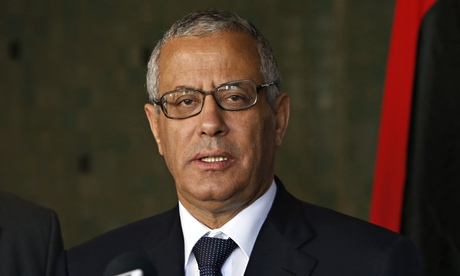 Libyan prime minister ousted by parliament
Libyan prime minister ousted by parliament
Ali Zeidan removed by vote of no confidence after militia seized port of al-Sidra and tried to sell oil to North Korean tanker
Associated Press
Libya's parliament has forced out the prime minister in a vote of no confidence, a move prompted by a crisis this week when a militia controlling an eastern port defied Tripoli's authority by trying to sell oil. The chamber named the defence minister as an interim prime minister until a replacement for Ali Zeidan is found.
The vote of confidence followed the standoff between the central government in Tripoli and powerful militias in the east of the country. A militia holding the key port of al-Sidra sparked a three-day crisis when it attempted to load oil into a North Korean-flagged tanker that had docked without government permission.
The confidence vote raises the potential for armed conflict. Most politicians in Libya are backed by militias with regional or ideological allegiances, who may not accept Zeidan's removal.
The parliament started off as a 200-seat chamber, but the number of its members has been reduced to 180 after a series of resignations and dismissals. The no vote won the support of 121 MPs. Source:
The Guardian UK
Loving one's neighbor amidst the horror of Central Africa
- Details
- Category: Current Issues
- Created on Saturday, 15 March 2014 00:00
- Hits: 4668
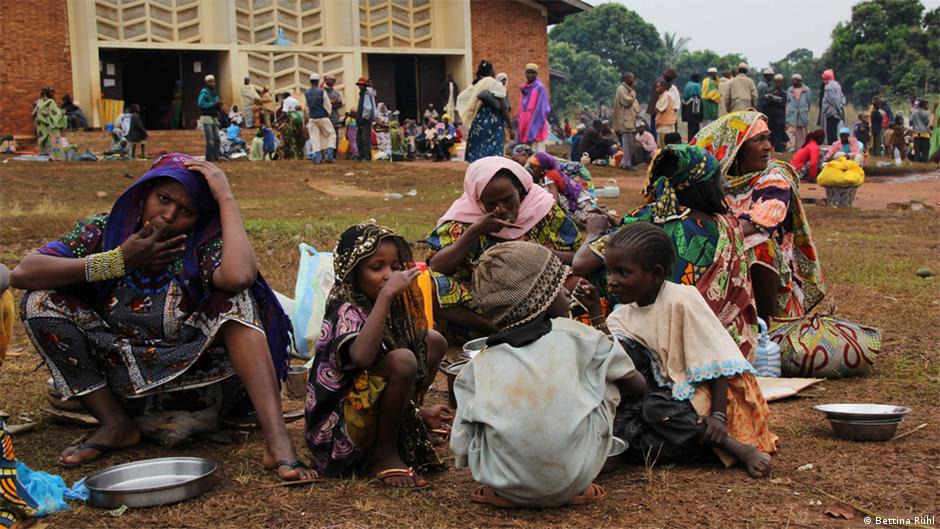 Loving one's neighbor amidst the horror of Central Africa
Loving one's neighbor amidst the horror of Central Africa
In the Central African Republic people are being hacked to death with machetes, shot dead or lynched as religiously-motivated violence escalates. But there are also people willing to help those targeted by the killers.
Women squat on the ground, cooking at open fires. Children struggle to get at the water stored in heavy canisters. The women wear headscarves, the men are attired in long robes and also have their heads covered. They are all Muslims, now living in a refugee camp in Boali, a town some 80 kilometres (49 miles) from Bangui, capital of the Central African Republic. Most have terrible tales to tell, many have lost close relatives. All fear for their lives.
Some 700 Muslims now live in this provisional camp. Its location - in the grounds of a Catholic church - sets it apart from other camps. The refugees live and sleep in the church building. They only cook outside.
Making way for Mass
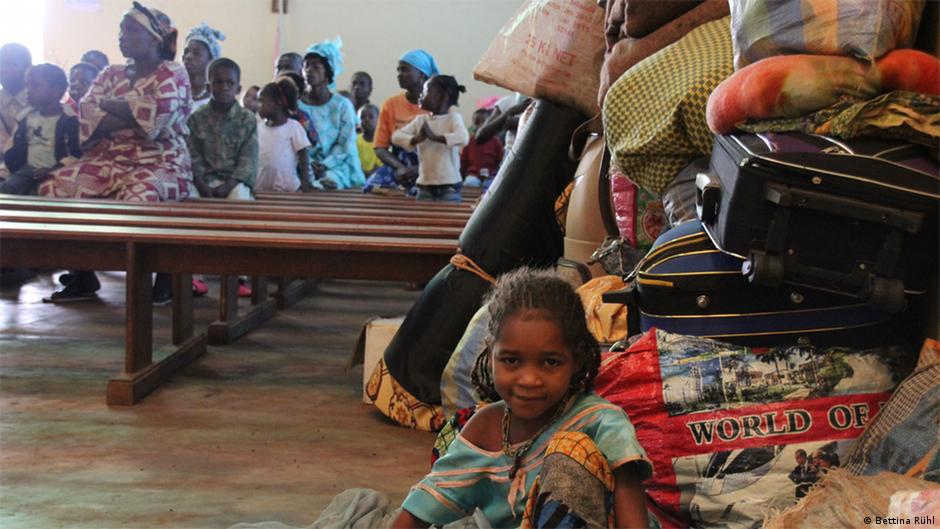 Today is Sunday. The refugees wait on the grass outside the church so that the Christian congregation can take their places on the benches inside. The camp inmates' belongings are pushed against the walls and into corners for the duration of the Mass. As soon as the service is over, the refugees go back inside.
Today is Sunday. The refugees wait on the grass outside the church so that the Christian congregation can take their places on the benches inside. The camp inmates' belongings are pushed against the walls and into corners for the duration of the Mass. As soon as the service is over, the refugees go back inside.
Father Xavier-Arnauld Fagba is the man who brought the Muslims here, to rescue them from the wrath of pro-Christian anti-balaka militias and other Christians living in the vicinity. The mob is out of control, in Boali and elsewhere. If a Muslim is seen on the street, he or she risks being killed. Human rights organization Amnesty International uses the term "ethnic cleaning" to describe what is going on. The United Nations warns of genocide. Since majority Muslim Seleka rebels overthrew President Francois Bozize almost a year ago, religiously-motivated clashes between Muslim and Christian militia groups have become frequent.
"What I do here is very little compared with what is really necessary," Father Xavier-Arnauld told DW after the Sunday service. "If someone else were in my place, he would have to do the same." But hardly anyone does. It is only thanks to such courageous individuals that Muslims in the Central African Republic are able to survive.
Saved at the last minute
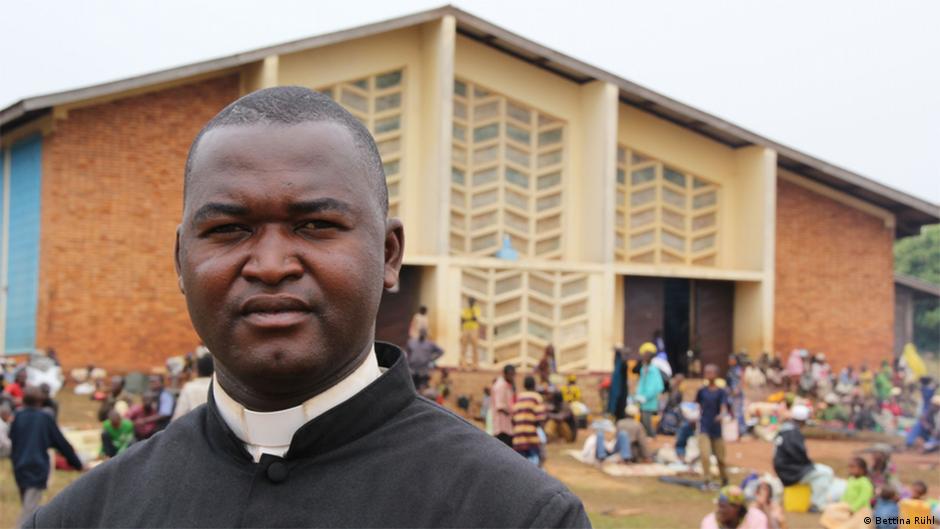 "While others just watched as crimes were being perpetrated, the deacon and I agreed in mid-January that we had to do something," the priest said. "We decided that we had to save the Muslims who were not getting help from anyone else." At the entrance to the town he and the deacon found many frightened Muslims hoping desperately for a last chance to flee. Father Xavier-Arnauld told them to follow him. The two priests then went from house to house to find more Muslims. Many had already fled into the bush. "We followed them and were able to persuade many to come with us," the priest said, adding that "some very committed Christians" had also helped in the rescue effort. "We brought the Muslims to our church, and since then, they have been here."
"While others just watched as crimes were being perpetrated, the deacon and I agreed in mid-January that we had to do something," the priest said. "We decided that we had to save the Muslims who were not getting help from anyone else." At the entrance to the town he and the deacon found many frightened Muslims hoping desperately for a last chance to flee. Father Xavier-Arnauld told them to follow him. The two priests then went from house to house to find more Muslims. Many had already fled into the bush. "We followed them and were able to persuade many to come with us," the priest said, adding that "some very committed Christians" had also helped in the rescue effort. "We brought the Muslims to our church, and since then, they have been here."
In the meantime, some Christians have also fled to the church, also targets of the allegedly pro-Christian anti-balaka militia. They include Christians who had helped the Muslims with food and water or had hidden them in their own homes.
No one is safe
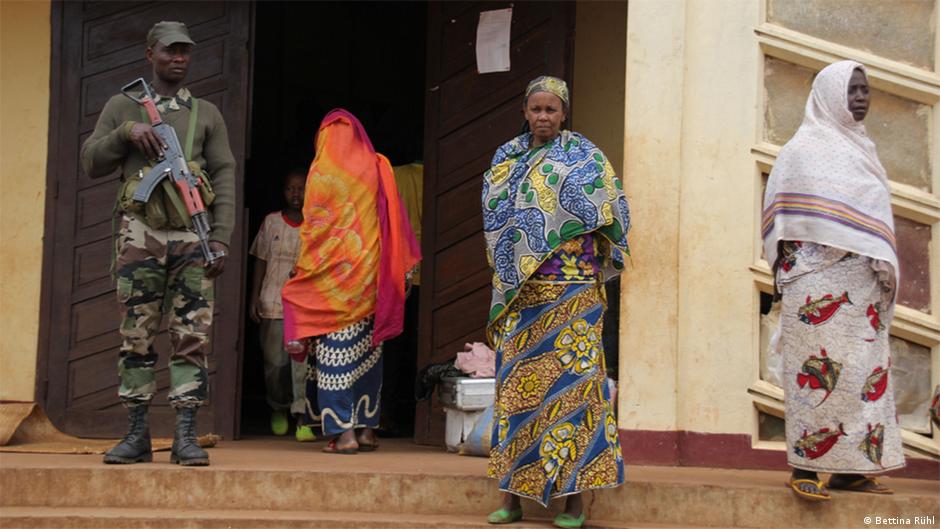 The priest is himself frequently a target of threats. Once he only just escaped with his life. After Sunday Mass he planned to visit a sick member of his congregation – no sooner had he reached the road outside the church grounds, than his car was surrounded by anti-balaka militias. "They were yelling and shouting that they wanted to finish me off." The priest got out of his car and asked the crowd what they wanted from him. "I said they could do what they liked with me. I had no fear of death." At that moment, one of the militia leaders arrived and dispersed the crowd. "He saved my life." Father Xavier-Arnauld said.
The priest is himself frequently a target of threats. Once he only just escaped with his life. After Sunday Mass he planned to visit a sick member of his congregation – no sooner had he reached the road outside the church grounds, than his car was surrounded by anti-balaka militias. "They were yelling and shouting that they wanted to finish me off." The priest got out of his car and asked the crowd what they wanted from him. "I said they could do what they liked with me. I had no fear of death." At that moment, one of the militia leaders arrived and dispersed the crowd. "He saved my life." Father Xavier-Arnauld said.
That experience did not deter him. Since then, militia members have several times entered the church grounds – despite the presence of soldiers of the African intervention force MISCA along the road outside. The Christian militias managed to injure two refugees within the church compound and since then the Muslims have trusted no one. Except perhaps Father Xavier-Arnauld and his deacon. But while the refugees are grateful for the hospitality they have received, all they can think of is flight and how to leave the country as quickly as possible.
Date 14.02.2014
Author Bettina Rühl / sh
Editor Mark Caldwell
Source: Deutsche Welle


